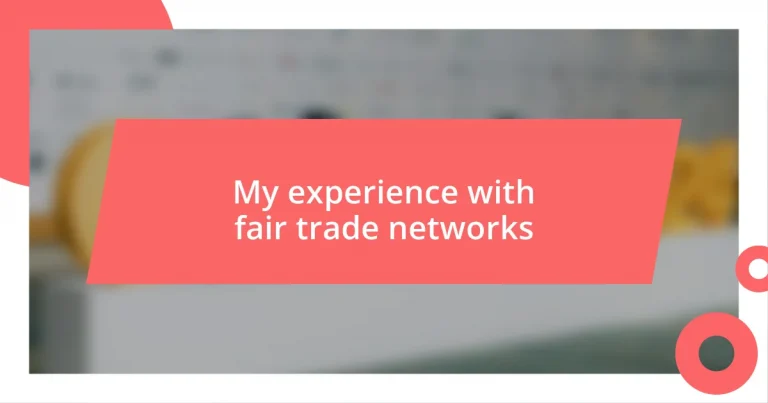Key takeaways:
- Fair trade networks foster ethical commerce by connecting producers directly with consumers, enhancing income and empowerment for marginalized communities.
- Challenges in fair trade, including resource access, certification complexity, and consumer misconceptions, hinder small producers’ progress.
- The future of fair trade looks promising with increasing consumer awareness, digital platforms enhancing transparency, and a collaborative community spirit that drives innovation.
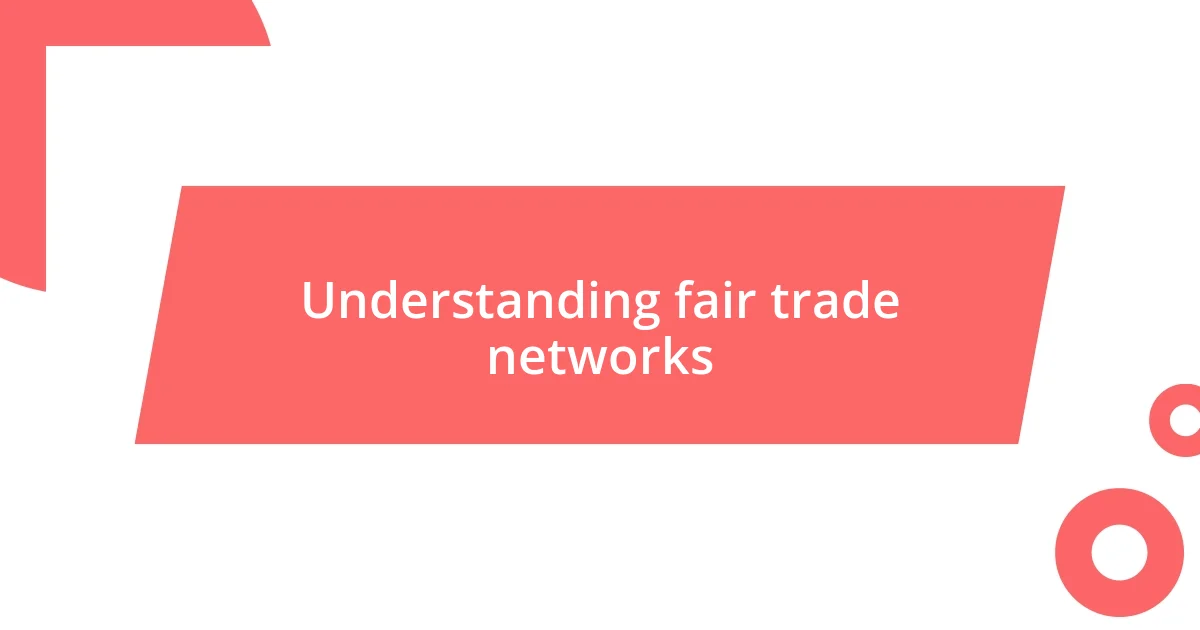
Understanding fair trade networks
Fair trade networks are fascinating structures designed to foster ethical practices in commerce. I remember the first time I learned about them—I was attending a fair trade expo and was overwhelmed by the stories of producers who, through these networks, could access global markets. This connection not only boosts their incomes but gives them a voice in a world that often neglects their needs. Isn’t it powerful to think that just knowing where your products come from can significantly change someone’s life?
At their core, fair trade networks prioritize transparency and sustainability. They often facilitate direct relationships between consumers and producers, which means that middlemen are minimized. From my experience, seeing this direct connection gives me a sense of purpose when I shop. Have you ever thought about how your purchasing choice impacts communities? I’ve found that when I opt for fair trade, I not only support artisans, but I also feel a part of a larger movement striving for social justice.
Understanding fair trade networks also means recognizing the certification process behind them. Achieving fair trade status involves meeting specific labor and environmental standards, which, as I’ve learned, can be a tough journey for many producers. It’s encouraging to know that by choosing fair trade, we’re supporting not just ethical farming practices, but also the empowerment of marginalized communities. Isn’t it rewarding to know that each purchase can contribute to a more equitable world?
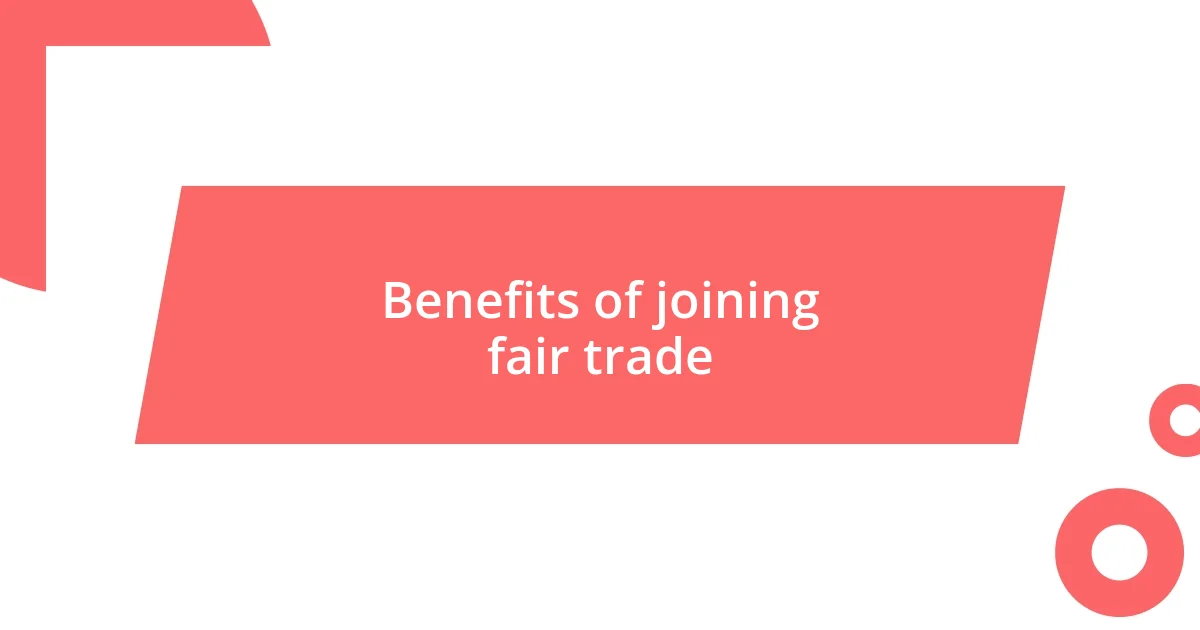
Benefits of joining fair trade
Joining fair trade networks offers a myriad of benefits that ripple positively through communities. One of the most notable advantages is the stable income that producers can achieve, which allows them to invest in their families and local projects. I remember meeting a group of women artisans who proudly shared that their earnings enabled their children to attend school—a dream that once seemed unreachable. It’s incredible how such a simple choice can lead to generational change and community growth.
Here are some key benefits of joining fair trade:
- Empowerment: Producers gain skills and knowledge that allow them to make informed decisions about their businesses.
- Community Development: Fair trade promotes better local infrastructure—think schools, healthcare, and clean water initiatives.
- Environmental Sustainability: Many fair trade networks prioritize eco-friendly practices, reducing environmental impact.
- Stronger Relationships: Direct connections between consumers and producers cultivate trust and foster meaningful relationships.
- Market Access: Joining fair trade allows producers to access previously unavailable markets, enhancing their economic stability.
Many nights after those encounters, I’d find myself reflecting on how the simple act of purchasing products can spark profound changes. I felt a warmth in my heart knowing that my choices could empower others, reinforcing my commitment to fair trade practices. It’s a connection worth nurturing, don’t you think?
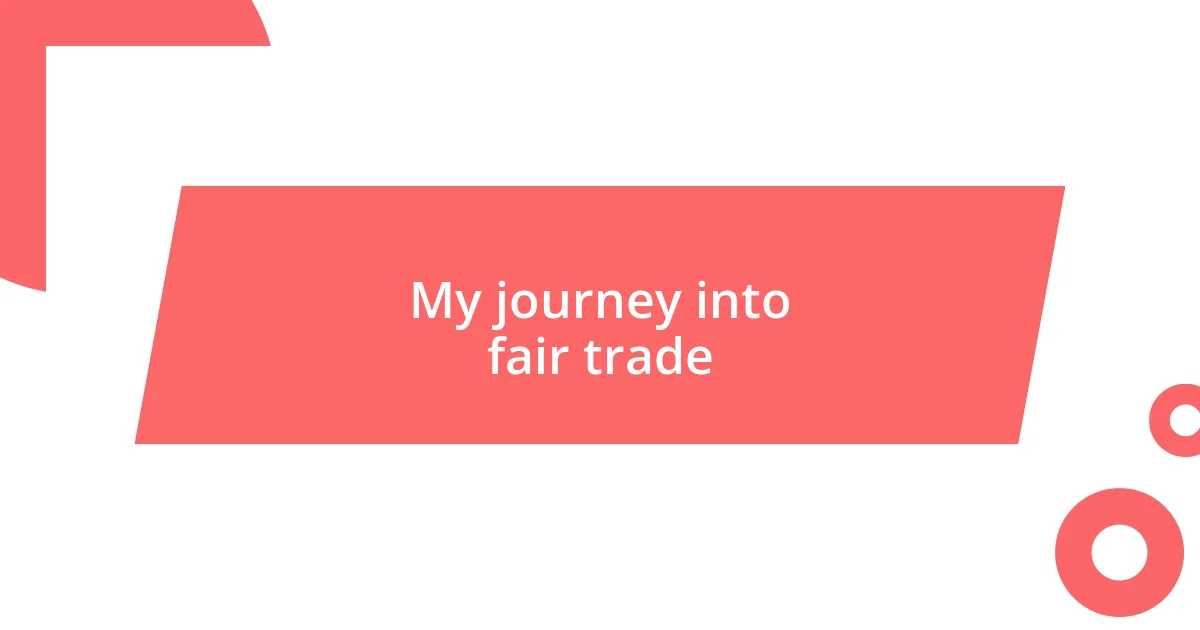
My journey into fair trade
As I embarked on my journey into fair trade, I initially approached it with curiosity, driven by a desire to understand how my everyday purchases could have a ripple effect. The first time I purchased a fair trade coffee, I was genuinely surprised at how much more I appreciated each sip, knowing that the farmers were treated fairly. It ignited a passion in me, realizing my buying choices could support livelihoods across the globe—what a fulfilling realization!
Over time, I got to know different artisans through my local fair trade store. I recall a particularly memorable conversation with a textile artist who shared her dreams for her community. Her enthusiasm was contagious as she explained how, through fair trade, she not only found joy in her craft but also inspired others to pursue their passions as well. The moment I saw the pride in her eyes made me truly appreciate the power of meaningful commerce.
Actually visiting a fair trade cooperatives brought everything to life for me. Walking through the workshops, I felt the warmth of camaraderie among the producers. Each product carried a story, and that connection was palpable. I realized that my choice was not simply about the product but about the people behind it—individuals who pour their heart into their work. What a powerful way to connect!
| Aspect | My Experience |
|---|---|
| Initial Curiosity | Engaging with fair trade sparked a profound appreciation for my choices. |
| Artisan Connections | A vivid conversation with a textile artist revealed the community impact of fair trade. |
| Personal Journey | Visiting cooperatives illuminated the stories behind the products and the people. |
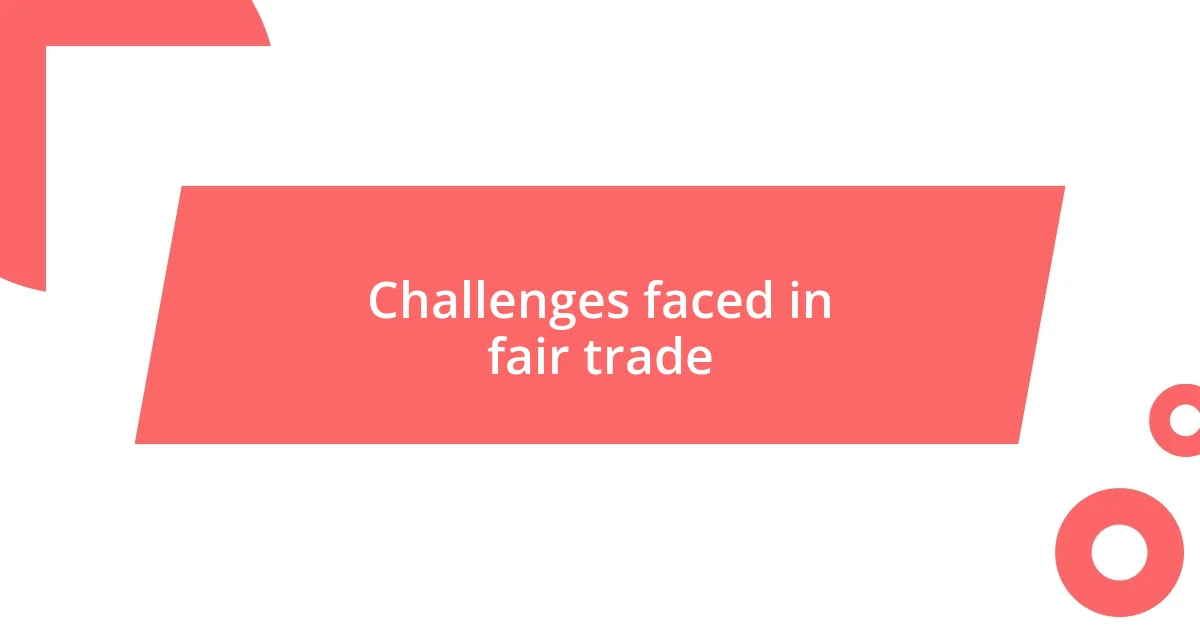
Challenges faced in fair trade
Navigating the fair trade landscape isn’t without its hurdles. For instance, many small producers struggle with accessing the necessary resources to maintain production, from quality materials to sustainable farming methods. I distinctly remember a discussion with a farmer who highlighted how inconsistent weather patterns caused by climate change were threatening his crops. It’s a poignant reminder that even the noblest of initiatives can be greatly affected by external factors.
Another significant challenge lies in the certification process itself. While I believe in the importance of maintaining high standards, I’ve witnessed firsthand how costly and complex the certification can be for small producers. I met a cooperative that wanted to become certified but simply couldn’t afford the fees and paperwork involved. Isn’t it frustrating to think that the people who deserve recognition for their hard work face barriers that could undermine their progress?
Additionally, there’s sometimes a disconnect between consumers’ expectations and the realities of fair trade products. I’ve encountered buyers who expect fair trade items to be just as cheap as conventional goods, overlooking the ethical practices involved in crafting these products. It’s crucial to educate consumers on why sustaining fair trade requires a different pricing structure. How can we bridge that gap and foster a deeper understanding around the value of fair trade? This is part of the ongoing dialogue we all need to engage in.
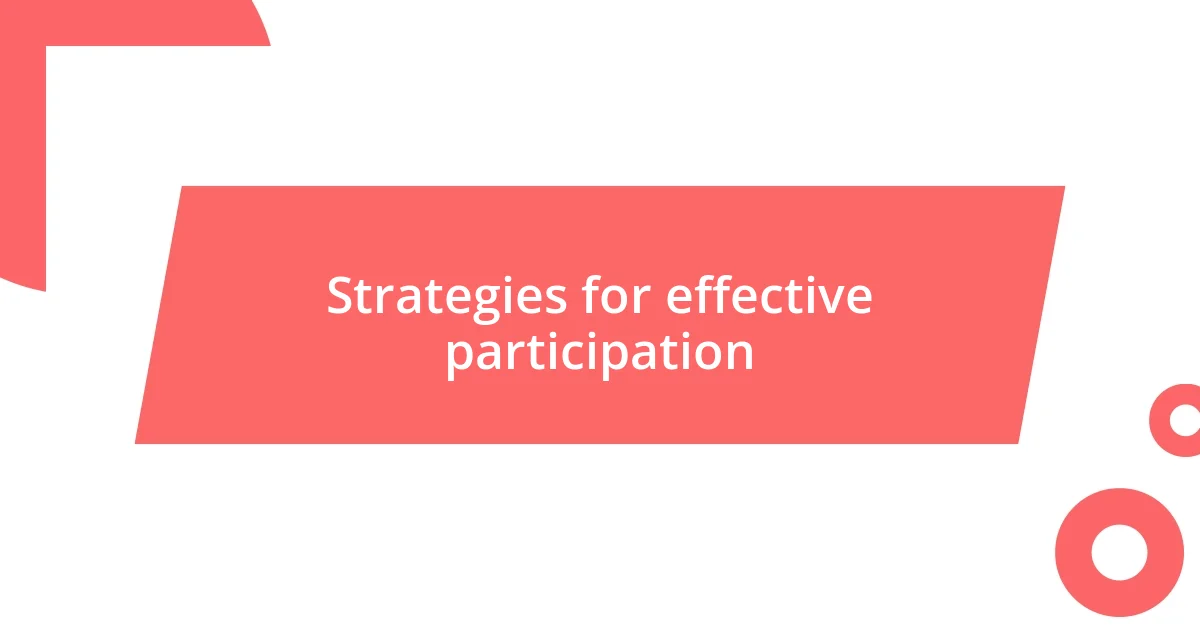
Strategies for effective participation
To effectively participate in fair trade networks, I’ve found that developing strong relationships with producers is crucial. The more you connect, the deeper your understanding of their challenges and aspirations. I vividly remember attending a local fair trade fair where I struck up a conversation with a coffee farmer. His stories not only enriched my knowledge but also inspired me to advocate for fair trade in my community.
Another strategy I’ve embraced is staying informed about fair trade practices and movements. By attending workshops and reading up on the latest developments, I feel better equipped to make informed choices. It’s empowering to share this knowledge with friends and family, sparking discussions that highlight the importance of ethical consumerism. Have you noticed how a single conversation can shift someone’s perspective?
Lastly, I believe that taking part in local initiatives amplifies your impact. Participating in community events or volunteering with fair trade organizations allows you to contribute directly to the cause. I once volunteered at a fair trade pop-up shop and was amazed by how many people expressed curiosity about the products. Those moments of connection reinforced my belief that each interaction is a chance to educate and inspire others, creating a ripple effect of conscious consumerism.
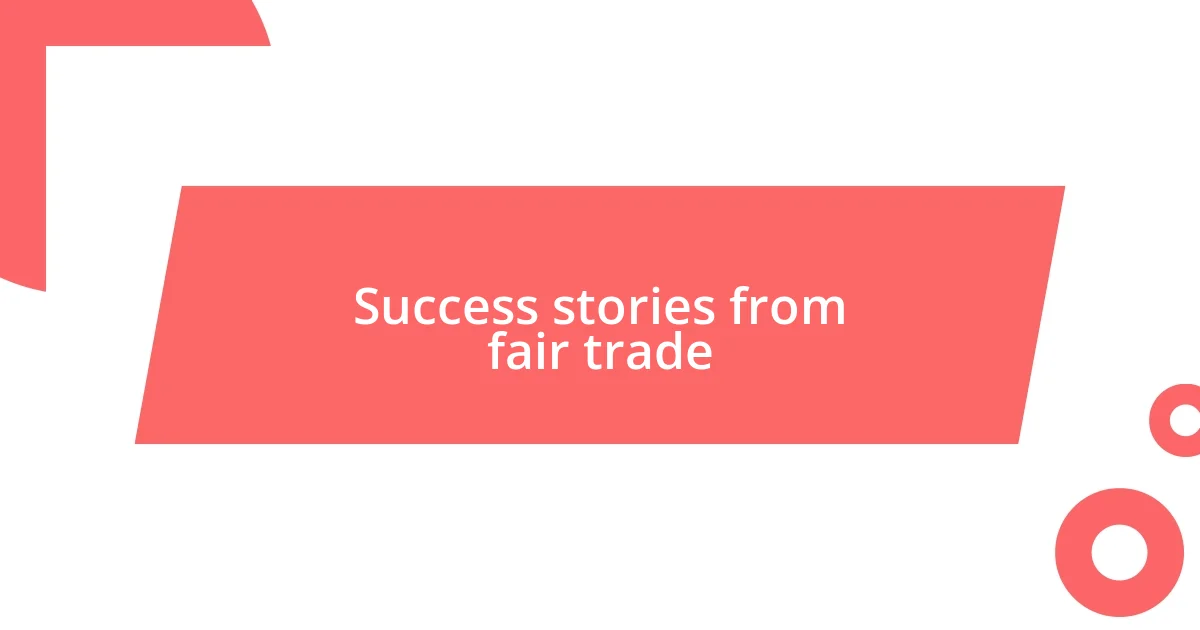
Success stories from fair trade
One inspiring success story that sticks with me is that of a women’s cooperative in Guatemala. They initially struggled to sell their handmade textiles but, after gaining fair trade certification, their products gained recognition internationally. I still remember visiting their vibrant stall at a market; the joy on their faces as they shared stories of empowerment and economic stability was contagious. It made me realize how fair trade can be a transformative force, elevating the lives of those who are often overlooked.
Another remarkable example is a cacao farmer in Ecuador who, thanks to fair trade networks, was able to invest in sustainable farming practices. I was fortunate enough to participate in a tasting session where he proudly presented his rich, luxurious chocolate. With the fair trade premiums he received, he built a school for his community, emphasizing that fair trade isn’t just about commerce; it’s about creating a lasting impact on people’s lives. Isn’t it amazing how quality products can directly lead to community growth?
I also recall attending a fair trade conference where a speaker shared a story about a coffee co-op that previously faced dire financial struggles. With the support of fair trade networks, they not only improved their farming methods but also established direct trade relationships with consumers. It was incredibly powerful to see how enthusiastic people were about buying coffee that directly supported farmers. That’s when I truly grasped the essence of fair trade: it’s not just a transaction; it’s a partnership fueled by shared values and commitment.
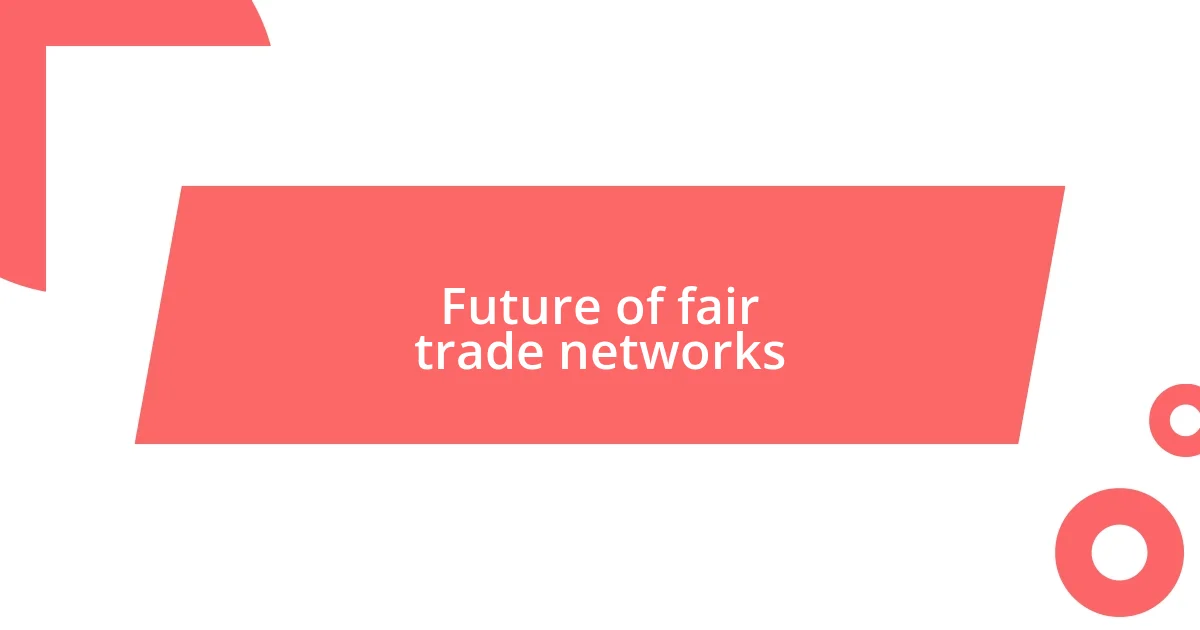
Future of fair trade networks
As I ponder the future of fair trade networks, I can’t help but feel a sense of optimism. With more consumers becoming aware of the impact of their purchasing decisions, I envision a growing movement towards ethically sourced products. Think about it: when was the last time you chose an item because you believed in the brand’s ethical stance? The ripple effect of such choices could redefine our marketplace.
I’ve noticed the rise of digital platforms connecting consumers directly with producers, which could revolutionize how we engage with fair trade. Just the other day, I came across a new app that allows shoppers to trace the origin of their coffee beans. It’s empowering and makes me wonder how many people would take a moment to check the story behind their purchases. This transparency fosters accountability and builds trust between consumers and producers.
Moreover, the collaborative spirit I see within fair trade networks could be key to their future success. I remember a recent event where artisans from different countries came together to share techniques and designs. Seeing their passion made me realize that fostering a sense of community could inspire innovation while strengthening our collective mission. What more could we accomplish if we embraced such collaboration on a wider scale?












